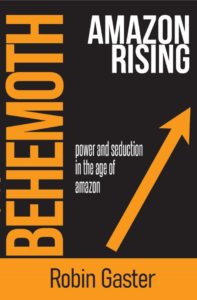[ad_1]

Don Davis, editor at large, Digital Commerce 360
The definitive book about Amazon.com Inc. and its founder has been Brad Stone’s “The Everything Store: Jeff Bezos and the Age of Amazon.” When that book was published in 2013, Amazon was generally admired and Bezos viewed as an exemplar of innovative entrepreneurship.
In 2021, however, the prevailing view of Amazon and other big technology companies is decidedly darker. That view pervades a new book on the ecommerce giant entitled “Behemoth: Amazon Rising,” by Robin Gaster, president of technology consulting firm Incumetrics.
Gaster gives Amazon credit for innovations like Kindle, Prime, Alexa and Amazon Web Services, and for maintaining an unbureaucratic, startup-like culture even as it’s grown into one of the world’s most valuable companies. But he also takes a hard look at Amazon’s deliberately hard-to-understand finances, at its allegedly arbitrary treatment of some marketplace sellers and at the often harsh reality of work at Amazon.
As a consumer, Gaster admits he loves Amazon. But as a citizen, he fears its growing power. He points out that it not only increasingly dominates retail, but is also moving into many other arenas, including entertainment, logistics, cloud computing and digital services for the home.
Data is central to the power of tech giants
Amazon shares some characteristics with other tech giants like Apple, Facebook and Google, Gaster says. “But,” he writes, “none is remotely like Amazon; and none radiates so powerfully the triggers for that lizard-brain message ‘danger.’”
Gaster does not think the issues posed by Amazon are identical to those posed by Google and Facebook, which he argues are essentially questions of free speech. Nor does he think antitrust action is the likely or even best way to address Amazon’s growing power.

Front cover of “Behemoth: Amazon Rising” by Robin Gaster
Instead, he proposes a novel solution: Treat Amazon the way utility companies are treated. That would mean requiring it to provide lots of data about its operations in real-time—not once a year in an annual report—and to obey an explicit set of rules. He contends that a similar approach might work for addressing concerns about other tech giants.
At the heart of his argument is the idea that these tech companies have grown powerful by collecting data on a scale that would have been impossible before the rise of the internet and digital technology. “And if control of data helps drive the creation of digital monopolies,” he writes, “then maybe the release of data can be used to limit their power.”
A new ‘digital platform regulator’
While revealing this data wouldn’t necessarily make Amazon a weaker competitor, it would expose its operations to the scrutiny of the public that makes up Amazon’s vast customer base. “It would not be good for them to be shown to treat people badly,” Gaster says.
Gaster proposes a new kind of regulatory body, a “digital platform regulator” that would oversee tech giants like Amazon, Google and Facebook. It’s an idea being actively discussed in the United Kingdom and the European Union. Whether the incoming administration of President Joe Biden will be open to such an idea is a question Gaster says he doesn’t have the answer to yet, but that he will be watching for as the new regime settles in.
The combination of a regulatory body that would set rules for platforms like Amazon and a steady flow of data about Amazon’s operations would empower the 2 million sellers on Amazon’s marketplaces around the world to monitor Amazon’s compliance, Gaster says. “Once the rules are in place you would have an enforcement army in place, and you can activate them by providing the ammunition of sunlight,” he says.
He proposes that Amazon be forced to continually provide this new regulatory body with data on listings by category, advertising rates, disciplinary action against sellers, Fulfillment by Amazon charges and how its search algorithms work. He further suggests the regulator impose rules to prohibit Amazon from selling below cost, disciplining sellers unfairly, preventing sellers from remarketing to buyers and favoring merchants that use FBA.
Does Amazon make money as a retailer?
The proposal for how to regulate Amazon comes at the end of “Behemoth.” It’s preceded by a close look at Amazon’s innovations, its growth in key sectors and its seamier sides, particularly its treatment of marketplace sellers and its own employees, both blue- and white-collar.
I especially appreciated his deep dive into Amazon’s financial reports in an attempt to understand where Amazon makes and loses money.

Robin Gaster, president of Incumetrics Inc. and author of “Behemoth: Amazon Rising”
That’s not easy, he points out, because Amazon doesn’t provide revenue and expenses by business unit. For example, it reports its revenue from subscriptions (mostly from its Prime loyalty program) and from services it provides sellers on the Amazon Marketplace—but it doesn’t provide the corresponding expenses for delivering benefits to Prime members or operating its shopping portal. That data would be necessary to understand which parts of Amazon’s business are profitable.
In chapter eight of his new book, Gaster breaks new ground by trying to fill in those blanks. He assembles a profit and loss statement for each of Amazon’s major business units by making assumptions about how revenue and expenses should be allocated when Amazon does not do so.
One conclusion he draws is that Amazon’s first-party sales of merchandise it owns is a deeply unprofitable business, one that lost more than $32 billion in 2019. He arrives at that conclusion by allocating $21.1 billion in shipping costs to Amazon’s 1P business, including its free shipping to Prime members, and an additional $11.5 billion for operating its fulfillment centers.
!function(e,i,n,s){var t=”InfogramEmbeds”,d=e.getElementsByTagName(“script”)[0];if(window[t]&&window[t].initialized)window[t].process&&window[t].process();else if(!e.getElementById(n)){var o=e.createElement(“script”);o.async=1,o.id=n,o.src=”https://e.infogram.com/js/dist/embed-loader-min.js”,d.parentNode.insertBefore(o,d)}}(document,0,”infogram-async”);
By contrast, he argues that Amazon Marketplace booked a profit of $17.8 billion, largely by taking in $53.8 billion in seller fees, including for storing and delivering goods for merchants that use Fulfillment by Amazon. Those fees, he says, cover the $16.8 billion in shipping costs and $9.1 billion for fulfillment centers that he allocates to Marketplace. He also estimates that Amazon made profits of roughly $10 billion each from AWS, advertising and subscriptions, which mostly comes from Prime memberships.
(He acknowledges at the end of the chapter that Amazon insiders tell him he is wrong about Amazon’s first-party business operating at a loss, “that Amazon Retail does make money, even if Marketplace makes more.” But he believes they are including revenue from advertising and Prime subscription fees that he does not believe should be credited to Amazon’s sales of merchandise it owns.)
Amazon’s defense against antitrust charges
If Amazon is indeed losing money on its first-party sales that might matter for two reasons.
First, Gaster argues that Amazon, recognizing that it’s losing money on most of its first-party sales, will steadily shift more products to the marketplace, buying less wholesale and encouraging third-party sellers to offer those goods on Amazon. He says this process is already underway, and that the percentage of goods sold by marketplace merchants could increase from just over 60% today to 80% within 10 years.
The other reason Amazon’s first-party losses might be of interest is if it provides a basis for antitrust complaints. It could be argued that Amazon is engaged in predatory pricing, in that it’s charging less for goods—and for free shipping—than its costs to drive competitors out of business.
However, Gaster argues that, even if Amazon is engaged in predatory pricing, it would still be immune from antitrust charges, at least in its home country, because the prevailing view in the U.S. is that a company is only guilty of antitrust violations if its actions result in consumers paying higher prices. As Amazon can make a strong case that it’s helped lower prices for consumers, it would seem safe from such a complaint, Gaster says.
He says there is an argument that marketplace sellers are paying higher prices because of Amazon’s dominant position among online retail sites where third parties can sell. But that would require defining sellers as consumers, which might be a stretch.
The other antitrust avenue would be for Congress to pass a new law redefining what constitutes antitrust. But Gaster says that could take a decade, even if there was a consensus to make that change, which is not yet evident.
Other ways of curbing Amazon
Gaster dismisses other remedies for Amazon’s power. Sen. Elizabeth Warren, a U.S. senator from Massachusetts and 2020 contender for the Democratic Party’s presidential nomination, has proposed forcing Amazon to separate its first-party retail business from its marketplace, so it would no longer be both the owner of the online shopping mall and the principal retailer. But Gaster contends that Amazon is slowly moving in that direction, by reducing the products it sells as a first party.
Others have argued for forcing Amazon to spin off its Amazon Web Services cloud-computing unit, which produced $9.201 billion in operating income for Amazon in 2019, or 63.3% of the company’s $14.541 billion in 2019 earnings, according to Amazon.
Gaster says that wouldn’t make as much difference as some believe because—if you accept his argument that Amazon Retail lost $32 billion in 2019—the rest of Amazon must have made more than $46 billion in profit. That would make the AWS share of Amazon’s profit less than 20%.
Plus, he says Amazon would realize a windfall of $500 billion or more from selling AWS. “Amazon would get a huge pile of cash and this stops them from doing something? How does that work?” he says.
While these remedies won’t work, Gaster argues something must be done to curb Amazon’s growing power. “The trifecta of Amazon Prime, the marketplace and its logistics operation have made it an unstoppable reality,” he says.
If Amazon were a person…
And, he says, Amazon won’t relent of its own accord. If Amazon were a person, Gaster says, it would be a vampire: “Agile, immortal, brilliant, efficient, superhumanly strong and intelligent, undeniably seductive. Yet also heartless, deeply amoral, selfish, exploitative, cold.
“All of that is on display at Amazon, where the cult of customer obsession provides all the moral justification that’s needed—for anything. In the world of Amazon, that end always justifies the means.”
While Amazon provides consumers great value, he concludes, “The question each one of us needs to answer, of course, is whether it’s worth the price. And who gets to pay it.”
Retailer rivals and marketplace sellers may recognize Gaster’s depiction of Amazon as ruthless in its behavior. “Behemoth: Amazon Rising” will provide that picture to a wider audience, including the opinion-makers and politicians whose views could lead eventually to the same action to curb Amazon.
The book will be released in March. And, yes, it will be for sale on Amazon.
The post An argument for a new kind of regulation of Amazon and other tech giants appeared first on Digital Commerce 360.
[ad_2]
Source link


